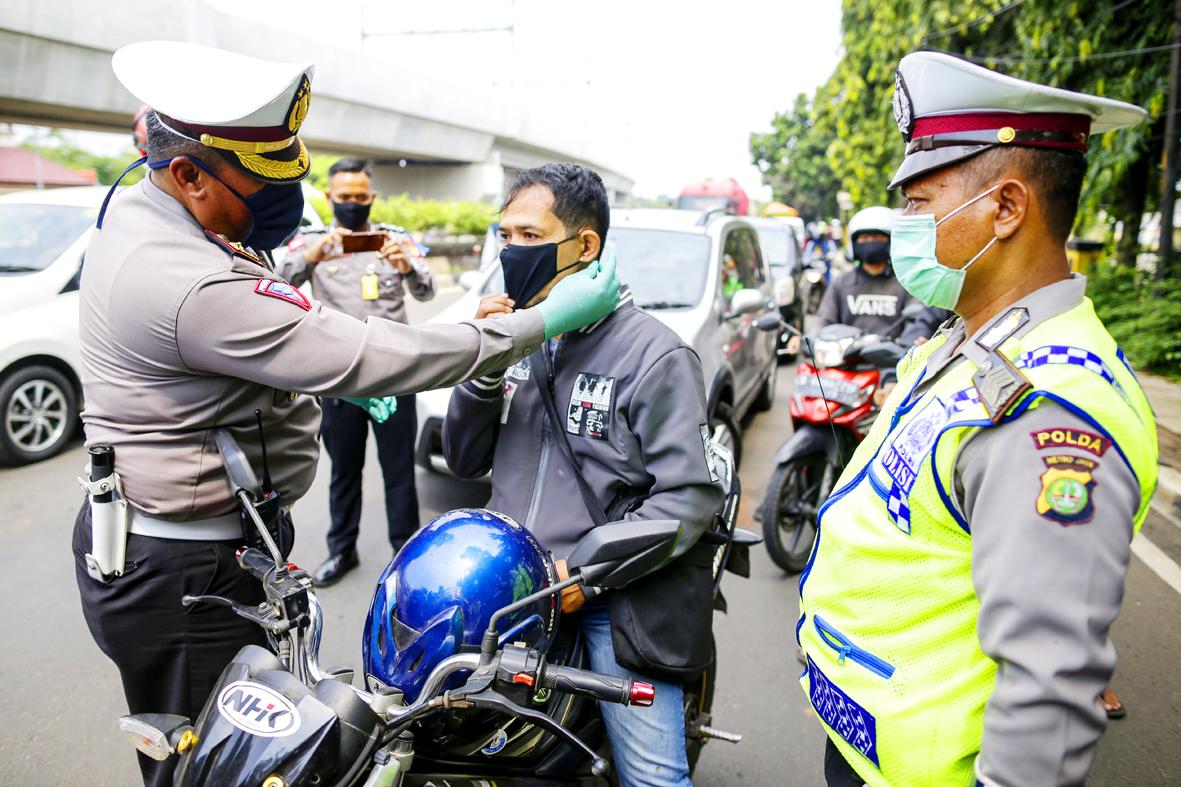Soldiers and police yesterday hit the streets of Indonesia’s capital, Jakarta, to enforce its toughest “social distancing” rules yet as COVID-19 infections surge and critics warn of a looming public health disaster.
Offenders face heavy fines and up to a year in jail for breaking the new rules, which include a ban on gatherings of more than five people, limiting restaurants to online delivery orders and reducing public transport.
Motorbike taxis seen everywhere in the megacity of about 30 million people were banned from picking up passengers and residents were ordered to stay home.

Photo: EPA-EFE
“I’ve been checking my smartphone all day, but no orders so far,” said Embari, a ride-hailing driver who goes by one name. “I know drivers can’t pick up passengers, but I was hoping for some food delivery calls.”
Mosques and other houses of worship were ordered to shut for at least the next two weeks — after millions continued to attend Friday prayers in the Muslim majority nation, despite calls to worship at home.
Indonesian President Joko Widodo last month declared a state of emergency as coronavirus deaths in the world’s fourth-most populous country jumped.
However, he resisted calls for a nationwide lockdown, fearing a collapse in Southeast Asia’s biggest economy, where tens of millions eke out a living on poorly paid, informal jobs.
Indonesia’s government has faced heavy criticism over its handling of the crisis and questions about the true number of deaths.
Officially, 280 people have died of the illness, with 3,293 confirmed cases as of Thursday in the archipelago of more than 260 million. That is the highest death toll for an Asian nation outside of China.
However, testing rates are among the lowest in the world and there are fears that the number of dead could be much higher.
Jakarta city data showed that about 776 suspected and confirmed patients had been buried in local cemeteries under COVID-19 protocols requiring bodies to be wrapped in plastic and quickly buried.
That is more than five times the official 142 dead in Jakarta, the epicenter of the outbreak in Indonesia.
Officials have admitted that data collection among different jurisdictions is patchy and incomplete.
“The Indonesian government needs to ramp up testing to know the true extent of the coronavirus outbreak in the country,” Human Rights Watch senior Indonesia researcher Andreas Harsono said. “The authorities should also uphold the right to information and provide accurate statistics to the public.”
Indonesia’s intelligence agency has projected about 95,000 infections by June.
A bleak assessment by the University of Indonesia’s public health department warned that the country could see a death toll of more than 240,000 if testing and quarantines are not ramped up.

POLITICAL PRISONERS VS DEPORTEES: Venezuela’s prosecutor’s office slammed the call by El Salvador’s leader, accusing him of crimes against humanity Salvadoran President Nayib Bukele on Sunday proposed carrying out a prisoner swap with Venezuela, suggesting he would exchange Venezuelan deportees from the US his government has kept imprisoned for what he called “political prisoners” in Venezuela. In a post on X, directed at Venezuelan President Nicolas Maduro, Bukele listed off a number of family members of high-level opposition figures in Venezuela, journalists and activists detained during the South American government’s electoral crackdown last year. “The only reason they are imprisoned is for having opposed you and your electoral fraud,” he wrote to Maduro. “However, I want to propose a humanitarian agreement that

Young women standing idly around a park in Tokyo’s west suggest that a giant statue of Godzilla is not the only attraction for a record number of foreign tourists. Their faces lit by the cold glow of their phones, the women lining Okubo Park are evidence that sex tourism has developed as a dark flipside to the bustling Kabukicho nightlife district. Increasing numbers of foreign men are flocking to the area after seeing videos on social media. One of the women said that the area near Kabukicho, where Godzilla rumbles and belches smoke atop a cinema, has become a “real

‘POINT OF NO RETURN’: The Caribbean nation needs increased international funding and support for a multinational force to help police tackle expanding gang violence The top UN official in Haiti on Monday sounded an alarm to the UN Security Council that escalating gang violence is liable to lead the Caribbean nation to “a point of no return.” Special Representative of the UN Secretary-General for Haiti Maria Isabel Salvador said that “Haiti could face total chaos” without increased funding and support for the operation of the Kenya-led multinational force helping Haiti’s police to tackle the gangs’ expanding violence into areas beyond the capital, Port-Au-Prince. Most recently, gangs seized the city of Mirebalais in central Haiti, and during the attack more than 500 prisoners were freed, she said.

DEMONSTRATIONS: A protester said although she would normally sit back and wait for the next election, she cannot do it this time, adding that ‘we’ve lost too much already’ Thousands of protesters rallied on Saturday in New York, Washington and other cities across the US for a second major round of demonstrations against US President Donald Trump and his hard-line policies. In New York, people gathered outside the city’s main library carrying signs targeting the US president with slogans such as: “No Kings in America” and “Resist Tyranny.” Many took aim at Trump’s deportations of undocumented migrants, chanting: “No ICE [Immigration and Customs Enforcement], no fear, immigrants are welcome here.” In Washington, protesters voiced concern that Trump was threatening long-respected constitutional norms, including the right to due process. The